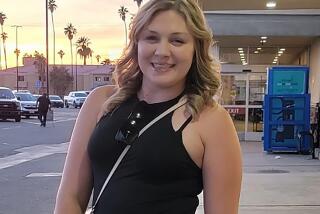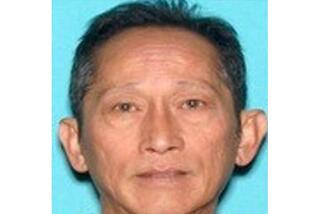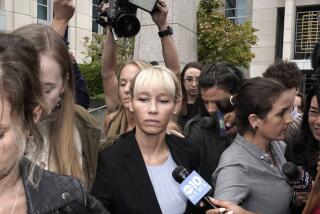Vallejo police assumed woman’s abduction was hoax because she ‘did not act like a kidnapping victim’
Vallejo police say they thought a woman’s kidnapping was a hoax after she reemerged days later wearing sunglasses, carrying an overnight bag and rejected offers to be reunited with her family.
In court documents recently filed in U.S. District Court, Vallejo police detectives revealed the reasons why they thought Denise Huskins’ disappearance was made up. Attorneys representing the officers also made an appeal to the judge to dismiss a federal case filed against them in March by Huskins and her boyfriend, Aaron Quinn, because they said their statements were made during an ongoing police investigation and are protected by law.
In a written statement filed in court documents, retired police Capt. James O’Connell said the kidnapping “instilled great fear within the Vallejo community.” When Huskins reemerged wearing sunglasses and carrying luggage, she “did not act like a kidnapping victim” and wasn’t cooperating with police, so they were unable to determine whether she was abducted, he said.
“In light of the new developments in the case, we wanted to comfort the Vallejo community by disclosing that our investigation had thus far determined that the community had nothing to fear,” O’Connell said.
He then instructed a police spokesman to tell reporters that Huskins’ disappearance appeared more “to be an orchestrated event than an abduction by a stranger.”
Huskins was kidnapped from the couple’s home in Vallejo more than a year ago. Quinn told police that Huskins had been “forcibly taken” from the home sometime between midnight and 5 a.m. on March 23, 2015. Quinn said that he was bound and drugged, that his eyes were covered with goggles and that headphones playing prerecorded instructions were placed over his ears.
Quinn told police he later awoke to find Huskins, his belongings and his car missing. A voicemail message demanding two payments of $8,500 was left behind, according to an unsealed federal affidavit by the FBI. He immediately called police.
As an investigation of Huskins’ disappearance was launched, Quinn voluntarily provided blood samples to police. He also provided passwords so that authorities could check his email activity.
Two days later, Huskins was dropped off at her family’s home in Huntington Beach. Authorities arranged a flight for Huskins to Northern California to interview her.
But when she never got on the plane, police grew suspicious and said the kidnapping appeared to be an “orchestrated event,” a “wild goose chase” and a waste of police resources.
Four months later, the FBI announced that it had found Huskins’ kidnapper — Matthew Muller, a Harvard-educated former attorney.
In court documents, lead investigator Det. Mathew Mustard said he was skeptical about Quinn’s story because of its “outlandish nature,” and thought it unlikely that kidnappers would go to such great lengths for a small ransom, $8,500.
Quinn, he said, had also told investigators that he and Huskins had been having relationship problems because he was trying to rekindle a romance with his ex-fiancee who had cheated on him with a police officer.
Several undeniable details stood out, the veteran detective said.
What was clear: Huskins was missing; the bedsheet was stained with blood; Quinn’s car, a blanket and comforter were missing; Quinn waited more than eight hours to report the abduction; and the kidnappers’ emails were coming from Quinn’s account. Huskins and Quinn, he said, also had been drinking the night before and talking about the relationship.
See the most-read stories in Local News this hour >>
In his declaration in court documents, Mustard said he had multiple theories about Huskins’ disappearance that could have resulted in criminal charges against certain people.
One of the theories, he said, was that Quinn had accidentally killed Huskins as they argued about their relationship and that he had concocted the kidnapping story.
Huskins’ reemergence in Huntington Beach days later was “inconsistent with the forcible kidnapping for ransom,” Mustard said.
She showed up to her mother’s home wearing sunglasses and with an overnight bag, he said.
“I found it unusual that she denied being a victim, did not wish to speak with Huntington Beach police, and instead wanted to speak with her lawyer,” Mustard said. “Strangest of all, when law enforcement arranged to fly Ms. Huskins to Vallejo, where all her family had gathered, she rejected the offer. I found it odd that a recently released kidnap victim would not want to go to her family.”
In the days after Huskins was found, her attorney was forced to defend her assertion that she had been abducted.
The couple’s attorneys insisted the kidnapping was real, saying she was sexually assaulted by her kidnapper before she was released. In their lawsuit, the couple said they were forced to move after their reputations were destroyed when investigators called her kidnapping a hoax instead of helping them.
“By filing these papers, Vallejo continues its misguided approach of blaming the victim,” her attorney Kevin Clune said in a statement. “Denise and Aaron have already experienced unimaginable horror at the hands of Vallejo. Amazingly, Vallejo now seeks money (in the form of legal fees) from these victims for asserting their civil rights. We have complete faith that the court will hold Vallejo accountable for its outrageous tactics.”
For breaking news in California, follow VeronicaRochaLA on Twitter.
MORE LOCAL NEWS
USC hosts ‘boot camp’ for military veterans aimed at easing culture shock of college life
California initiative draws fire for opening the door to TV ads that promote pot smoking
He was homeless — but to get help, the rules said he had to prove it
More to Read
Start your day right
Sign up for Essential California for news, features and recommendations from the L.A. Times and beyond in your inbox six days a week.
You may occasionally receive promotional content from the Los Angeles Times.






